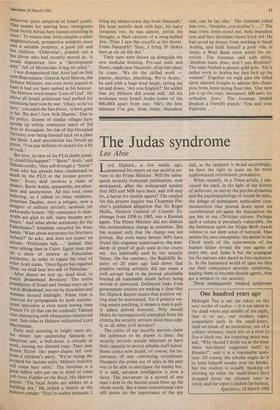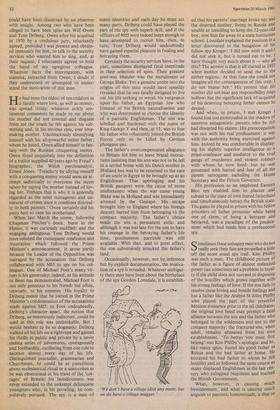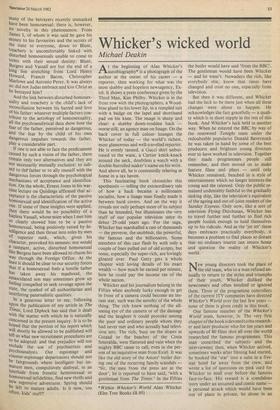The Judas syndrome
Leo Abse
Lord Diplock, a few weeks ago, presented his report on our security ser- vices to the Prime Minister. Will the subse- quent severely truncated publication, now anticipated, allay the widespread anxiety that M15 and MI6 have been, and still may be, a haven for double agents? The catalyst for this present inquiry was Chapman Pin- cher's published allegation that Sir Roger Hollis, Director General of Counter Es- pionage from 1956 to 1965, was a Russian agent. The Prime Minister. did not dismiss this extraordinary charge as nonsense. She has insisted only that the charge was not proven. But even many lawyer MPs have found this response unpersuasive: the stan- dards of proof of guilt used in our courts are not habitually used by our security forces. On the contrary, the Radcliffe In- quiry of 20 years ago laid down that positive vetting certainly did not mean a civil servant had to be proved unreliable beyond all reasonable doubt before being moved or dismissed. Deliberate leaks from government sources are making it clear that the Diplock Report insists that positive vet- ting must be maintained. Yet if positive vet- ting means anything, it means a man is guil- ty unless proved innocent. Why should Hollis be retrospectively exempted from the criteria the security services insist must app- ly to all other civil servants?
The critics of our security services claim the inference to be drawn is clear: the security services remain reluctant to have their capacity to recruit reliable staff tested. Some cynics now doubt, of course, the im- portance of any continuing recruitment blunders: the prime use of spies in the past was to be able to anticipate the enemy but, it is said, advance intelligence is now a farce. The movement in a second of one man's arm to the button could blow up the whole world. But a more conventional view still insists on the importance of the spy and, as the taxpayer is levied accordingly, we have the right to insist on far more sophisticated recruitment procedures.
When recently, in a Times article, I can- vassed the need, in the light of the history of defectors, to survey the psycho-dynamics and the psychopathology of would-be spies, the deluge of subsequent ambivalent com- munications that poured down upon me corroborated yet again the fascination the spy has in our Christian culture. Perhaps such a culture is peculiarly vulnerable, for the insistence upon the Virgin Birth stands witness to our deep sense of betrayal. Man resents his own conception: the denial in the Christ myth of the intervention of the human father reveals the true agony of every son, and Judas is but the scapegoat for the parents who dared to love exclusive- ly. In the fantasised world of spies we blot out their compulsive neurotic symptoms, leading them to become double agents, that are a menace to our security.
These inadequately masked symptoms could have been discerned by an observer with insight. Among two who have been alleged to have been spies are Will Owen and Tom Driberg. Owen after his acquittal in 1970 by a credulous jury, reluctantly agreed, provided I was present and obtain- ed immunity for him, to talk to the security services who wanted him to sing, and, at their request, I reluctantly agreed to hold the hand of my egregious colleague. Whatever facts the interrogators, with stamina, extracted from Owen, I doubt if they understood or attempted to under- stand the motivation of this man.
He had been the oldest of ten children in a family where love, as well as money, was spread thinly: whatever sickly sen- timental comments he made to me about his mother did not conceal and disguise from me the wrath he felt against his sub- mitting and, in his envious eyes, ever love- making mother. Unconsciously identifying himself with his all-powerful miner father, whom he hated, Owen allied himself in fan- tasy with the Russian conquering enemy. Owen fitted exquisitely into the definition of a traitor supplied 40 years ago by Freud's biographer, the Welsh psychoanalyst, Ernest Jones. 'Treachery by allying oneself with a conquering enemy would seem an at- tempt sadistically to overcome the incest taboo by raping the mother instead of lov- ing her. Perhaps that is why it is generally regarded as the most outrageous and un- natural of crimes since it combines disloyal- ty to both parents.' Owen certainly did his puny best to rape his motherland.
When last March the storm, following Chapman Pincher's book, burst in the House, it was curiously muffled: and the engaging ambiguous Tom Driberg would have relished the consequent confusion and frustration which followed the Prime Minister's announcement. It arose partly because the Leader of the Opposition was outraged by the accusation that Driberg collaborated with MI5 to spy on his col- leagues. One of Michael Foot's many vir- tues is his generosity: indeed, as his attitude to Benn has demonstrated, Michael Foot is not only generous to his friends but often, unwisely, to his enemies. His loyalty to Driberg meant that he joined in the Prime Minister's condemnation of the accusations made against MI5: to Foot undoubtedly, Driberg's character apart, the notion that Driberg, so notoriously indiscreet; could be used in this role was unthinkable. But I would hesitate to be so dogmatic: Driberg walked all his life on a tightrope and gained his thrills in public and private by a never ending series of adventures, courageously and foolhardily, oscillating from one role to another almost every day of his life. Distinguished journalist, grammarian and Churchman, he could be as punctilious about ecclesiastical ritual or a semi-colon as he was obsessional in his trawl of the 'cot- tages' of Britain: his fastidiousness was never extended to the unkempt delinquent youngsters who, in his prowling, he com- pulsively pursued. The spy is a man of many identities and each day he must act many parts. Driberg could have played the part of the spy with superb skill, and if the officers of MI5 were indeed inept enough to have attempted to recruit him, then, in turn, Tom Driberg would undoubtedly have gained especial pleasure in fooling and betraying them.
Certainly the security services have, in the past, sometimes displayed fatal ineptitude in their selection of spies. Their greatest post-war blunder was the recruitment of George Blake. Yet a genuine probe into the origins of this man would have speedily revealed that he was fatally designed to live out his life seeking to wreak his vengeance upon his father, an Egyptian Jew who boasted of his British naturalisation and who was determined to choose the identity of a patriotic Englishman. The son was labelled and burdened with the name of King George V and then, at 13, was to lose his father who voluntarily joined the British Forces only to be killed by German phosgene gas.
The father's overcompensated allegiance to Britain led him to leave brutal instruc- tions insisting that his son was not to be left in a settled home with his Dutch mother in Holland but was to be returned to the care of an uncle in Egypt to be brought up as an Englishman. That upbringing and his British passport were the cause of more misfortunes: when the war came young Blake was in Holland and was immediately arrested by the Gestapo. His escape brought him to England where his foreign descent barred him from belonging to the compact majority. The father's choice made the son a permanent exile: and although it was too late for the son to have his revenge in the betraying father's life time, posthumous parricide was still available. With elan, and to great effect, the son subversively attacked the father's land.
Occasionally, however, not by inference but by explicit documentation, the motiva- tion of a spy is revealed. Whatever ambigui- ty there may have been about the birthplace of the spy Gordon Lonsdale, it is establish-
'We don't have a village idiot any more, but we do have a village mugger.' ed that his parents' marriage broke up; and the deserted mother, living in Russia and unable or unwilling to keep the 12-year-old boy, sent him far away to a state institution school. Lonsdale explained the position Ma letter discovered in the bungalow of his fellow spy Kroger: 'I did now wish it and I did not seek it, but it turned out to be. I have thought very much about it — why all this? The answer is that it all started in 1932 when mother decided to send .me to the nether regions. At that time she could not imagine all the consequences of this step. I do not blame het.' His protest that his mother did not bear any responsibility rings hollow: but the significant lack of acquittal of his deserting betraying father cannot be denied. And when, in prison, I met Kroger I found him too enshrouded in the shadow of assertive antagonistic parents who he felt had thwarted his claims. His preoccupation was not with his real predicament: it was with the authority being exercised against him. Indeed he was comfortable in display- ing his slightly superior intelligence as a priest-confessor and mediator to the rival gangs of murderers and violent robbers with whom he now lived: but he was possessed with hatred and fear of all the parent surrogates including the Home Secretary and the Prison Governor.
His profession as an employed Eastern Bloc spy enabled him to placate and submit to the state of own feared fatherland and simultaneously betray the British state. The game he played in prison with his fellow prisoners of father protector while being one of them, of being a betrayer and betrayed, was a paradigm of the predica- ment which had made him a professional spy.
Sometimes these unhappy men who do not really seek their fate are propelled a little off the more usual spy trail. Kim PhilbY was such a man. The childhood picture of the father as a figure of almost unlimited power can sometimes set a problem in loyal- ty if the child does not succeed in disposing of the hostility which grows together with his strong feelings of love. If the son fails to resolve these loving and hostile feelings and has a father like the Arabist St John PhilbY who played the part of the powerful Moslem eminence grise to the oil chieftains, the original love bond may prompt a fatal alliance between the son and the father who belonged in the wilderness and not to the compact majority: the fractured son, when adult, remains alienated from his own establishment. 'To betray you must first belong' was Kim Philby's apologia: and be, like many spies, found his good father in Russia and the bad father at home. He betrayed his bad father to whom he felt hostility and so followed the same course as many displaced Englishmen in the last cen- tury who eulogised Napoleon and loathed the British Government.
What, however, is causing much bewilderment, and what is causing much anguish to patriotic homosexuals, is that so
many of the betrayers recently unmasked have been homosexual: there is, however, no novelty in this phenomenon. From James 1, of whom it was said he gave his money to his favourites and the secrets of the state to everyone, down to Blunt, treachery is uncomfortably linked with disturbed homosexuals unable to come to terms with their sexual destiny: Blunt, Burgess and Vassal! are but the end of a long line stretching from Lord Henry Howard, Francis Bacon, Christopher Marlowe and Antonio Perez. It was always so: did not Judas embrace and kiss Christ as he betrayed him?
And the link between disturbed homosex- uality and treachery is the child's lack of reconciliation between his hatred and love of his father: whatever multiple factors con- tribute to the aetiology of homosexuality, all the psychoanalytical data show how the fear of the father, perceived as dangerous, and the fear by the child of his own dangerous impulses towards the father, play a considerable part.
If one is not able to face the predicament caused by such a vision of the father, there remain only two alternatives and they are not necessarily mutually exclusive: to sub- mit to the father or to ally oneself with the dangerous forces through the psychological mechanisms of acceptance and identifica- tion. On the whole, Ernest Jones in his war- time lecture on Quislings affirmed that ac- ceptance is the characteristic of the passive homosexual and identification of the active one. If some of these insights were applied, then there would be no possibility of a hapless Vassall, whose mien when I met him so clearly showed him to be a passive homosexual, being positively vetted by In- telligence and then thrust into roles by men of superior rank, which, given his character, provoked his nemesis: nor would a rampant, active, disturbed homosexual like Burgess have been allowed to charm his Way through the Foreign Office. At the least it should be clear to our security forces that if a homosexual feels a hostile father has taken away his manhood, the emasculated son may sometimes grow up feeling compelled to seek revenge upon the state, the symbol of all authoritarian and interfering paternalistic qualities. In a generous letter to me, following upon the publication of my article in The Times, Lord Diplock has said that it dealt with the matter with which he is naturally concerned in the present inquiry. It is to be hoped that the portion of his report which will shortly be allowed to be published will tell us what new recruitment procedures are to be adopted: and that prejudice will not exclude the use of psychiatrists and psychoanalysts. Our espionage and counter-espionage departments should not be fairgrounds where intelligent but im- mature men, compulsively disloyal, in an interlude from frenetic heterosexual or homosexual infidelities, find new thrills and new regressive adventures. Spying should be left to mature adults. Is it now, too Often, kids' stuff?




































 Previous page
Previous page